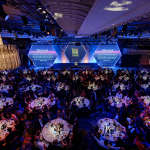Arbitration today is full of routine corruption and rogue elements disrupting the process, argued Quinn Emanuel Urquhart & Sullivan’s Stephen Jagusch QC (pictured) at Legal Business’s International Arbitration Summit in November.
The second annual arbitration event held at The Brewery saw a panel comprising a quartet of silks, including Jagusch, Boies, Schiller & Flexner’s Wendy Miles QC, Fountain Court Chambers’ Brian Doctor QC and 20 Essex Street’s Duncan Matthews QC.
The group discussed how arbitration has typically struggled to deal with corruption issues on cross-border cases, and whether authorities are typically less willing to provide information.
Jagusch told delegates: ‘Arbitration today is riddled with rogues and corrupt parties and I fear there are far more corrupt counsel and corrupt arbitrators than any of us are aware. A cursory review of the internet and taking some anecdotal evidence from practitioners will disclose that there is routine corruption in bidding processes, in maintaining investments, in protecting investments from scrutiny and local authorities. There is routine corruption in arbitral appointments.’
Citing one of his own cases this year, Jagusch noted that death threats were involved as well as a presiding arbitrator ‘being caught boasting generally about his ability to deliver a good result, providing the party appointing him was prepared to share the result with him’.
In the same case, he said ‘the controlling mind’ of the two parties on the other side was caught red handed boasting that he had bribed the chair of the tribunal with 10% of the awarded amount.
‘No longer are challenges to arbitrators unusual; no longer are allegations of corruption a surprise; no longer are findings of corruption a surprise. Corruption and guerrilla tactics are very much part of the arbitration lexicon these days, but they were not ten or 15 years ago. Corruption is here and it is everywhere.’
However, Doctor countered that while he had heard about corrupt arbitrators, he had never come up against one. He added: ‘Of course everybody believes the arbitrators before whom you are not doing very well must have taken the money to stop the absurd attitudes that they have.’
Despite the endemic problems that Jagusch highlighted, arbitration’s popularity in recent years has improved among clients, with the number of cases registered at the London Court of International Arbitration also increased last year, up 10% to 326 claims, while the number of new cases registered at the Singapore International Arbitration Centre rose by 22% to 271 in 2015.
sarah.downey@legalease.co.uk
Read more: ‘Everything must go – the London arbitration price war’











